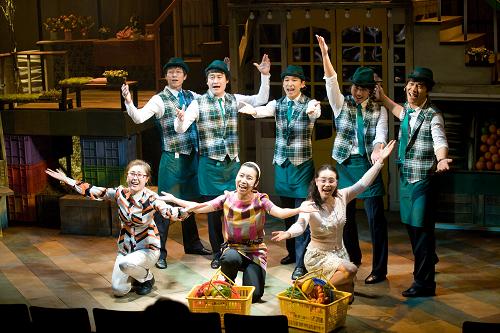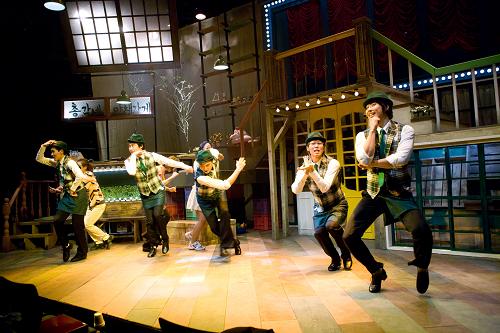Chonggakne vegetable market, where joy is for sale

ALL FRESHMEN enter college with a fluttering heart, dreaming of a bright future. The increasing youth unemployment rate constantly makes a splash on the news, but it seems like a problem far from their own concerns. Yet once they face up to the realities of the job market, students begin to doubt if they really have the time to spare for thinking about their dreams. Some end up rationalizing to themselves that settling down with any job that can guarantee a steady income is enough. Like many of the youth today, the five young men in the musical Chonggakne Vegetable Market 2.0 struggle between their dreams and the paths more commonly taken, crying out, "Where is my life going? Where have my dreams gone?"
Breaking the prejudice
The musical is based on the actual success story of the Chonggakne vegetable market. Lee Yeong-seok, the owner, started the business from scratch, but, with an exceptional work ethic, has now established a nation-wide vegetable franchise. The plot and the characters in the musical are mostly fictional, but Lee's experience is translated into the main character Tae-sung, who leads his friends Min-seok, Yoon-min, Ji-hwan, and Chul-jin in running the store. The high quality of the products and the kind service of the five cheerful men put a lasting smile on the face of every customer. The bubbly energy of the men's positive attitude is effectively conveyed through the actors' lively performance, leaving the audience feeling refreshed.
A college graduate working full time at a vegetable market? One might exclaim in pity, "Another victim of youth unemployment!" Yet the characters in the musical prove that this is a mere prejudice. Tae-sung held a job at a marketing company, but quits to start the vegetable market in the hope of creating a company that gives opportunities to those who are willing to work hard. His mindset is clearly different from that of common job seekers who avoid arduous jobs. Moreover, unlike many sellers whose primary concern is making profit, he takes the path of a true merchant, bringing his customers joy and earning their trust. The members of the market come to share his work philosophy and all together they shout out, "We sell joy, not products. Cheers to the beautiful world of dreaming young men!"
Together we stand
Going against the stream is always full of obstacles. Eventually, reality comes clashing with the five men's vision. Each member's personal circumstances develop into a collective crisis. For instance, Min-seok gets a high-salary offer from a corporation. Torn between a socially recognized profession and the job that gives him pleasure and satisfaction, he gets in frequent conflicts with Tae-sung. The audience watches nervously to see if such conflicts will lead to a split, but the five men's companionship holds them together in the end.
The musical reveals how companionship keeps the men on track to a common goal through a frame narrative. Su-jin, an aspiring documentary director who falls in love with Tae-sung, serves as the narrator. She writes a script about the history of the Chonggakne vegetable market which is reenacted to the audience. The musical employs flashbacks, emphasizing the contrast between the passion and energy the men had in the beginning and their lack of spirit later on. The audience senses that the memories of the old days remind the men of their initial determination and motivate them to work together once again.
In a society where individualism prevails, people are only focused on their own goals and ignore the value of achieving something together. They recognize those around them as competitors rather than friends: people to step on rather than walk with. Yet the characters in this musical see that success is even more meaningful when achieved with companions. Min-seok recalls a proverb to Tae-sung―"Go on your own if you want to go fast and go together if you want to go far"―to which Tae-sung answers, "Let us go far."
No MSG added
Interestingly, the musical is said to be "organic", a word commonly used to describe farm products raised without chemicals. What elements of a musical would make it organic? Those who attend the musical will be able to notice such elements both on and off the stage. The stage is filled with a whole variety of fresh and colorful fruits and vegetables. In between the acts, actors give out seasonal fruits to the audience. Those who give the correct answers to little quizzes about fruits and vegetables also receive prizes like bananas, tangerines, and sweet potatoes raised in organic farms.
The word "organic" refers not only to the freshness of the materials but also the purity of the five men's dream and youthful enthusiasm. Lee Jae-kuk, the writer of the musical, explains, "When you love someone, at first you only care about the person. But then you start to think about things like money. Likewise, when you look for a job, your initial passion for what you want to do is later blurred by working conditions and wages. Whether that be love, dreams, or whatever, the untainted mind you have in the beginning is what's organic. Everything else would be MSG."
* * *
In a society that places so much emphasis on material success, many of the youth today find it hard and even unrealistic to pursue their true dreams over more financially promising careers. Chonggakne Vegetable Market portrays this reality, but it does not intend to criticize it. Rather, the musical seeks to communicate with the youth of today, consoling their troubled hearts and giving them hope and courage. Tired with doing activities that do not interest you just for your resume? Overwhelmed with worries about your uncertain future? You might as well come and see Chonggakne Vegetable Market and absorb the pure and fresh energy of the greens.

Interview with Lee Jae-kuk (Writer)
What motivated you to write a musical about the Chonggakne vegetable market?
While I was looking for something different from the existing romance stories, I came across the Chonggakne vegetable market. I witnessed the employees working there so joyfully. The products tasted great and the store was doing excellent business, which made me wonder what was the driving force behind all that. I wanted to deliver to the audience the refreshing energy I felt at the store through a performance. I thought this material would be especially suitable for the musical genre because the cheerful voices of the employees and the customers sounded like a song to me. The whole scene was just so rhythmical.
Chonggakne Vegetable Market 2.0
Genre: Musical
Place: Daehangno, SM Art Hall
Running Date: Jan. 15, 2010~June 30, 2010
Price: R ₩35,000, S ₩20,000 (All Seats ₩20,000 with Student ID Card)

